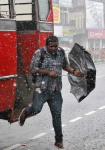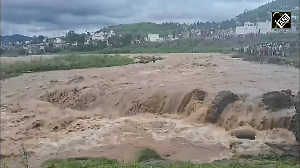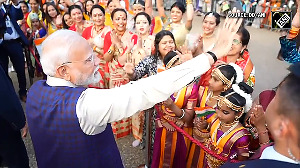Discrediting of the Pakistan army offers itself as the most appropriate and important strategic objective for India at present. It happens to be the largest Islamist army in the world. No reference is intended either to Islam as religion, or to Pakistan as an Islamic republic in describing the Pakistan army as an Islamist army. An Islamist army promotes and executes the Pan-Islamist agenda.
The attack on Mumbai looks like the work of some 'Islamist' conglomerate led by the Pakistan army as the main promoter/entrepreneur. There has been an agreement about sharing of risks and distribution of spoils amongst the participants. Additional risks to the industrialised north that could have arisen solely from 26/11 must have been evaluated as minimal by the Islamist conglomerate. It need not fear special reprisals from the US on this account.
The US is precariously poised between two administrations. The US and its NATO allies are facing recession. The domestic issues of employment, recapitalisation, social security, and the like, dominate the thinking everywhere. No one wants to rock the boat. 'Let us cut out the overseas commitments to the extent that we can' seems to be the present mood. Historical evidence tells the US and its NATO allies that staying on in Afghanistan is a losing proposition.
'Outsourcing' of peacekeeping in Afghanistan as soon as the Al Qaeda threat to the industrialised north is contained or eradicated must appear to be a good proposition to the US. Skin and chunks of meat off India's back is unlikely to attract any additional reaction from the US and NATO allies against the Islamists. On the contrary, it is likely to yield the serendipitous outcome of the US becoming more dependent and beholden to the Pakistan army.
The creation of an Islamist Pakistan was not the idea of President Zia-ul Haq. Its progenitor was the late prime minister Zulfikar Ali Bhutto who sold the idea of the 'Islamic' bomb in the hands of an Islamist Pakistan to many in the Muslim world. He created Islamist 'freedom fighters' to regain Kashmir, a dream he had nursed since early 1960s. He also became a 'military' dictator -- chief martial law administrator -- and firmly implanted the idea of authoritative regime in Pakistan as an extension of his personal agenda. Zia learnt fast, and decided that the Pakistan army will itself turn into an Islamist army and become the core of Pakistan. Ever since then Pakistan has been the cradle of Islamist terrorism.
He declared that the Pakistan army was his constituency and assiduously nursed it into an Islamist outfit. Zia also created other constituencies for the Pakistan army: The Inter Services Intelligence, the nuclear establishment, and the fundamentalists -- ideologues, and the 'jihadi' foot soldiers.
During the heyday of Pakistan-US cooperation against the 'infidel' Soviets, the US Central Intelligence Agency instructed the ISI and the Pakistan army in tradecraft. The ISI learnt everything about the raising of non-attributable funds, creation of irregular bands of jihadis, mounting operations by infiltration, successful ex-filtration after the operation in case of partial success, retaining credible deniability in the event of failure and so on.
US and Saudi funds poured into Pakistan and very soon, the common man identified the Islamist tone of the nation with its prosperity, and was grateful to the Pakistan army for its firm guiding hand.
In any case, the Pakistan army explained to them, that Islam did not particularly recommend democracy. The army, in this manner, has built a nation around itself. It has interwoven the Islamist ideology and the corresponding terror apparatus into the fabric of Pakistan. It has also succeeded in exporting this mindset to Bangladesh. Hopefully, now that Muslim scholars in India have authoritatively stated that Islam abhors terrorism, the people in Pakistan and Bangladesh may question the fundamentalist doctrine of the Pakistan army.
Very few armies in the world could have survived the ignominy of ceding Bangladesh, and almost 90,000 prisoners, after facing a series of defeats at the hands of the Indian defence forces in 1971. Not only that, it soon picked itself up and licked its wounds, it also imprisoned and hanged Bhutto, and thereafter created for Pakistan a unique and lasting power structure in which the army always has a dominating position with full veto powers.
It built upon two major initiatives of Bhutto, the atomic bomb, and the strategic relationship with China with an anti-India orientation. The US has been of active assistance to the Pakistan army in creating the power structure with the wherewithal and active assistance in return for its help in the 1980s. The US also chose to look in the other direction when it knew that Pakistan was developing an atomic device.
The US successfully resurrected Germany and Japan that it had reduced to dust with incessant bombing with financial and other assistance. The US, because of this experience firmly believes that it is good enough to follow immediate objectives in total disregard of the collateral damage and the long-term consequences of their actions. This attitude cost the US dearly. The rise and advent of the Pan-Islamist organisations in Afghanistan and Pakistan ultimately yielded '9/11' for the US. Some genies refuse to go into the bottle again. But the US continues with its short term interests.
No wonder therefore, that Condoleezza Rice, the US Secretary of State, had scripted in advance her forthcoming statements during her visit to India on December 2, and subsequently in Pakistan on December 3. It looks as if she had to make no changes. She expressed solidarity with India in fighting terror, and added dollops of sympathy for India.
She was as indignant as the best of Indians and roundly condemned the terrorists; she also promised help. In Pakistan, she admired the attitude, and the effort made by the democratically-elected president of Pakistan in fighting terror. She explained that both are friends of the US and both must cooperate in their own interest.
Of course, India has the right of self defence. Has not the president-elect of the US (Barack Obama) said as much? It would be, however, very unwise for India to destabilise this entire region at this stage. Ultimately, the instability would hurt India. The conclusion is that India should gather all the evidence with great care, in which the Federal Bureau of Investigation would help, and then share it with Pakistan who is eagerly waiting to examine it with judicial impartiality. If that does not suffice, the matter could always be referred to the US and other NATO allies.
An unambiguous message by the chief of the Pakistan army to the US and its NATO allies started off this pantomime. He had informed them that he would have no choice except to withdraw 100,000 troops from Pakistan's western border with Afghanistan in order to deal with the situation likely to arise because of Indian actions in response to '26/11'. He made it very clear that it was a US problem and it had better solve it. Pakistan asked the US to make sure that India does not amass troops on its eastern border, carry out strikes on its soil, or indulge in some such activity.
In short, he asked the US to ensure that India desisted from using force or its threats against Pakistan on pain of leaving the Pakistan's western border to the tender mercies of the Taliban and other sundry players. Suddenly, Pakistan's problems, of its own making, turned into the worries of the US.
It is unrealistic of India to expect US help in fighting terrorism that can be linked to any of the terrorist-constituencies of the Pakistan Army by whatever acronyms they are described -- LeT (Lashkar-e-Tayiba), or IM (Indian Mujahideen), or DM (Deccan Mujahideen), to name the latest. The US may help India in piecing the local contacts of the Pakistani terrorists, so that it can mete out justice to them, or keep them under surveillance with a view to neutralising future attacks.
The US and the NATO allies may also benefit by being able to connect other dots elsewhere, say in Israel, the UK, or Europe with the fresh leads gathered in India. Beyond, India must take care of itself. The proposed US strategic partnership with India aims at events and happenings that are on distant horizon at present.
The proposal that India should present to Pakistan the evidence, left behind by the perpetrators of '26/11', for its evaluation and acceptance is not meaningful. It amounts to saying that the perpetrators have to be satisfied by the evidence that the victim presents to them. India would only succeed in telling Pakistan what it has not found out, or how it has overlooked what was obvious. The suggestion is ludicrous, if not macabre. Is this what the theatre of the absurd all about?
It is the Pakistan army, which, for its own survival and aggrandisement, has created a particular mindset in Pakistan. It has persisted in spreading the canard that hostility with India is essential to the very existence of Pakistan. Such, at one time was the common belief in Pakistan, but of late there is a slow change and many of the discerning elites now feel that continued hostility with India will impose an unacceptable burden on Pakistan. The Pakistan army resists this onset of liberating trends by systematically fuelling separatism in the Kashmir valley, by undertaking operations in Kargil, and the like.
Fanning fear of India in Pakistan has been the main theme of the Pakistan army. It is the fountainhead of instability in the subcontinent. It is ruling Pakistan by proxy.
It would be an extremely difficult task to discredit the Pakistan army. It is bold and brazen, and at the same time, it knows how to survive.
A mix of means, not excluding force and its threats would have to be employed by befriending all those who look to terminate the Islamists in the subcontinent. It is for India to make the people of Pakistan aware that 'Hindu' India poses no problem to it. India just cannot 'rule' over Pakistan, or dictate terms to it, what with Pakistan's 97 percent Muslim population. India has neither the design nor the ability to do so. Yes, Pakistan would and could happily coexist with India in the subcontinent, and both countries could prosper.
The importance of faith would never be subsumed in the subcontinent, and India in no circumstances would ever want to prescribe to Pakistan either secularism or democracy. India respects the choice of the people of Pakistan; they must decide according to their outlook.
India had better brace itself to trudge alone and unaided in achieving its strategic objective. However, the rewards would be many and satisfying: the Kashmir problem will evaporate, the South Asian Association for Regional Cooperation will acquire substance, and the subcontinent will be on its way to coherence.
The matching of 'means' with the stated strategic objectives is the more difficult part of the strategy. However, without the guiding light of the strategic objective, no beginning will ever be made. Means may have to be fashioned if they are not available.
The first step, of course, is to suitably enable and task the intelligence apparatus so that it can pursue the strategic theme in making its plans and processing the information that it obtains. India can no longer rely on information when it chances upon it, or which is fed to it; nor must it face the prospect of irreversible damage.
Preparedness for war ensures peace, and not pacifism, or appeasement, as was found to its terrible cost by Great Britain in 1930s. Mobilisation need not mean war, provided appropriate communication is maintained and care is exercised. Mobilisation and concentration does not rob skilful commanders of opportunities to achieve surprise. In fact, they create new possibilities. We have the example of President Anwar Sadat of Egypt achieving complete surprise in 1973 in spite numerous concentrations, followed by subsequent withdrawals. India has the option of repeating 'Parakram', or parts of it, as many times as it likes, till all the means required by it for the final push are available. There is no cause or justification for dithering at this stage.
Ashok Joshi retired as a lieutenant general from the Indian Army.






